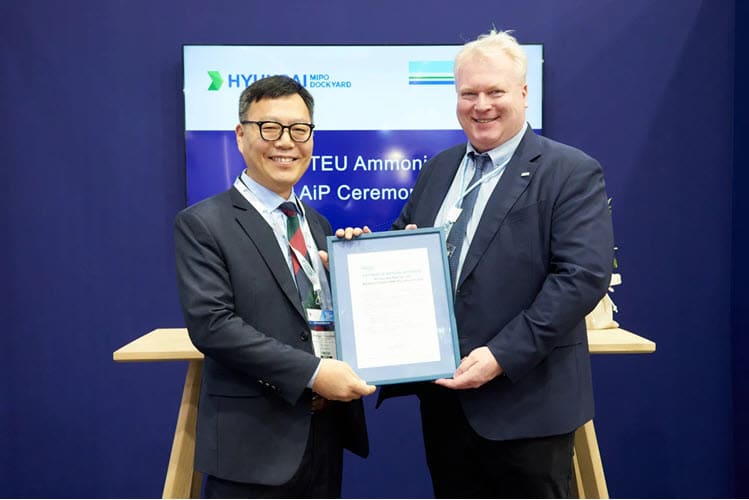DNV awarded HD Hyundai Mipo an AiP for ammonia dual fuel feeder container vessel

From the AiP award ceremony. From left: Yihyo Chung, Vice President, HD Hyundai Mipo and Vidar Dolonen, Regional Manager Korea & Japan at DNV Maritime.
At the Posidonia trade fair, classification society DNV awarded HD Hyundai Mipo an Approval in Principle (AiP) for the design of a new ammonia dual fuel feeder container vessel. The AiP is the result of a collaborative effort between HD Hyundai Mipo, WinGD, HD Hyundai Heavy Industries, Kangrim Heavy Industries, and DNV.
In a significant leap towards sustainable maritime operations, the shipping industry is increasingly focusing on ammonia as a potential zero-carbon fuel. This shift is in response to the International Maritime Organization’s ambitious greenhouse gas reduction strategy, aiming for a carbon emission net zero target by 2050. Ammonia, when produced sustainably, emerges as a promising candidate, albeit with challenges due to its toxicity and supply issues.
HD Hyundai Mipo, under the leadership of Dongjin-Lee, is pioneering the development of ammonia-powered container ships. With a history of delivering the first-of-their-kind dual-fuel propulsion ships, the company’s expertise is now steering them towards mastering ammonia fuel technology. Their latest ammonia-powered feeder container ship is a testament to their commitment to safer decarbonization trends in the industry.
The vessel boasts an engine from WinGD, and a fuel supply system and boiler designed by HD Hyundai Heavy Industries and Kangrim Heavy Industries, respectively. It incorporates cutting-edge AI technologies for autonomous navigation and an integrated safety control system, monitored via CCTV to ensure real-time hazard analysis and prevention. The inclusion of a Type C fuel tank further underscores the emphasis on minimizing leakage risks, marking a new era of eco-conscious and safety-oriented maritime travel.
Vidar Dolonen of DNV Maritime acknowledges the collaborative effort of this innovative partnership, setting a precedent in the industry’s journey towards decarbonization.
An Approval in Principle (AiP) is an independent assessment of a concept within an agreed framework, confirming that the design is feasible, and no significant obstacles exist to prevent the concept from being realized.
